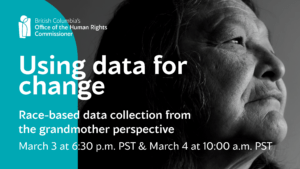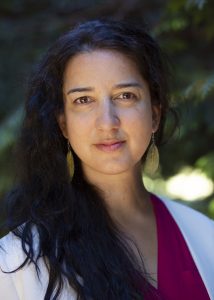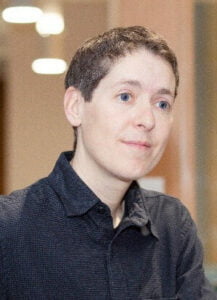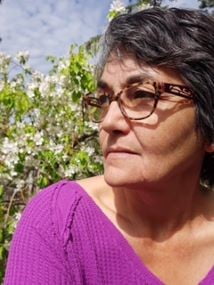
General
March 3, 2021, 10:30 am - 12:00 pm

In 2020, BC’s Office of the Human Rights Commissioner released the report: Disaggregated demographic data collection in British Columbia: The grandmother perspective. The report calls on government to collect race-based and other disaggregated data to illuminate systemic inequalities and injustices. It cautions, however, that the process of collecting, storing and sharing data is of critical importance. Since the report’s release, we have received many questions asking:
“How can disaggregated data address systemic racism?”
“What are the risks of disaggregated data collection to my community?”
“How can I apply the grandmother perspective in my work?”
Join one of our engaging webinars to hear answers to these questions and more.
Each 1.5-hour webinar is free to attend. Co-presenting with Commissioner Kasari Govender and BCOHRC’s Executive Director, Research and Policy, Trish Garner, will be B.C. First Nations Data Governance Initiative champion Gwen Phillips, a data governance expert from the Ktunaxa Nation who offered the grandmother perspective. A Q&A will follow their presentations. Full bios below. We are pleased to offer two sessions:
An evening webinar on Wednesday, March 3:
A daytime webinar on Thursday, March 4:
We look forward to the sessions! Please email Emily Chan, Research and Engagement Coordinator, at emily.chan@bchumanrights.ca or through our toll-free number at 1-844-922-6472 with any questions.
We will send out materials, including the presentation slides and Zoom Webinar information sheet, two days before each webinar. We will also offer closed captioning at both sessions.

Kasari Govender (she/her) took office as B.C.’s first independent Human Rights Commissioner on September 3, 2019. Her role is to lead the promotion and protection of human rights in British Columbia through the Office of the Human Rights Commissioner.
Govender has devoted her life to promoting human rights, with a focus on the rights of those most marginalized. From 2008 until 2019, Govender held leadership positions at West Coast LEAF, including as Executive Director from 2011. Earlier work includes pivotal roles in establishing the Rise Women’s Legal Centre, a nonprofit legal clinic in British Columbia.
Govender earned her law degree from the University of Victoria and her Master’s Degree in International Human Rights Law from the University of Oxford, U.K. She has taught as an Adjunct Professor of Law at the University of British Columbia and as an instructor at Simon Fraser University. In 2019, her work was recognized by the Women Lawyer’s Forum with their Award of Excellence. In addition to her role as Human Rights Commissioner, Govender is a mother, an aunt, a daughter and a sister.

Trish (they/their) is a tea-swilling Brit with a passion for social justice. Having gained their experience at the Canadian Centre for Policy Alternatives and working with Raise the Rates, an anti-poverty group based in the Downtown Eastside of Vancouver, they led the BC Poverty Reduction Coalition for eight years before joining BCOHRC. Through this work with people in poverty, they came to learn that it all comes down to relationships grounded in respect for each other, so they try to slow down to take the time to build trust and relationships with folks and now bring this foundation to their work.
They are excited about the systemic mandate of BCOHRC because they believe in going upstream to tackle the root causes of issues to prevent the crisis. They have graduate degrees in both engineering and gender studies, as well as experience in community-based research and policy analysis, and strive to do research differently to make a difference. They are inspired by all who came before them in this work and those who are currently organizing for social change.
To get away from it all, you will find them on the ocean with their partner and three kids.

Gwen (she/Grandma) is a citizen of the Ktunaxa Nation and has worked for the Ktunaxa Nation Council for the past thirty-seven years, holding a variety of senior management functions, at times overseeing departments of Education, Health, Corporate Services, Traditional Knowledge and Language and for the past decade, functioning as the Director responsible for Governance Transition; leading the Ktunaxa Nation back to self-government.
Gwen is currently championing the BC First Nations’ Data Governance Initiative (bcfndgi.com); a tripartite government initiative (federal, provincial and First Nations governments) with a key objective being that federal, provincial and First Nations governments, have timely access to quality data to plan, manage and account for investments and outcomes associated with First Nations well-being. As a member of the First Nations Health Council, Gwen is part of the team that negotiated the transfer of Health Canada’s BC Region First Nations and Inuit Health Branch to First Nations control, and she represents BC First Nations’ interests nationally in Data Governance, as a member of the First Nations Information Governance Centre Board.